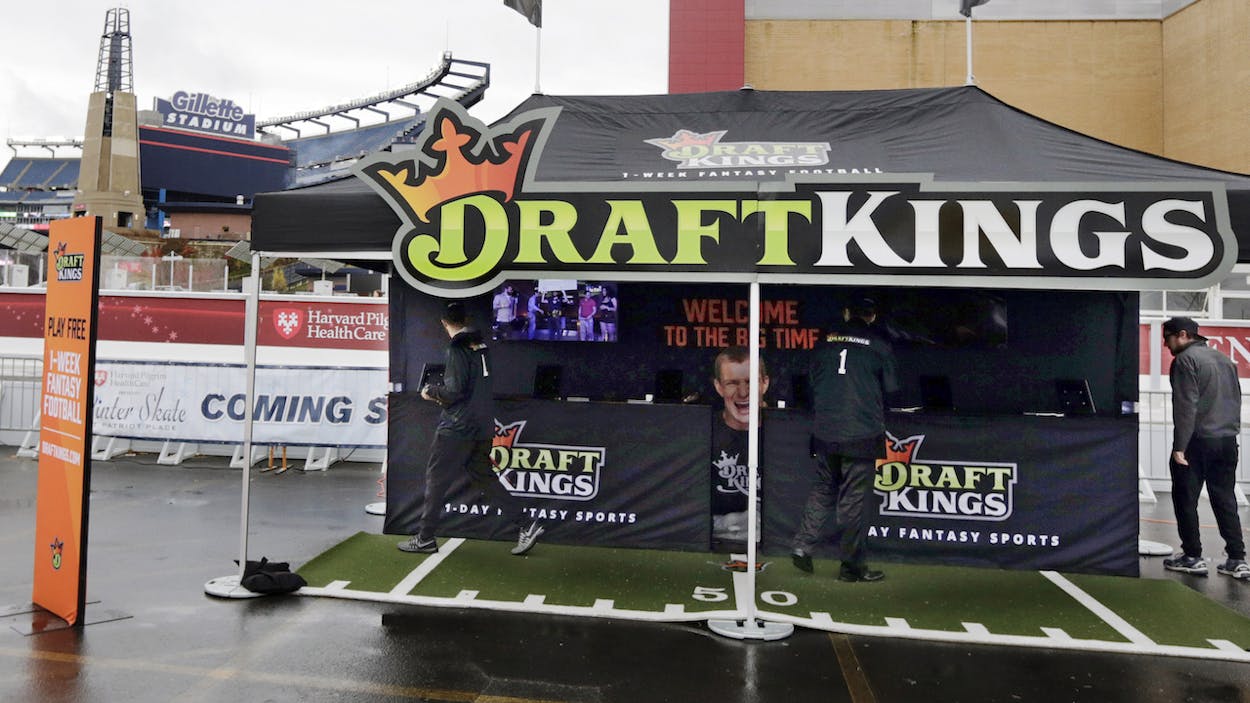On Tuesday, beleaguered Texas Attorney General Ken Paxton took a break from tending to the various personal legal fires that he’s dealing with to address one that faces the state. Namely, the question of whether daily fantasy sports sites like DraftKings and FanDuel are actually gambling sites, rather than games of skill—and if so, if they’re illegal under Texas law. And, lo, Paxton’s legal opinion is that they are gambling contests, and thus illegal.
Paxton’s non-binding reasoning hinges on the fact that, since it’s impossible to know who will succeed in a given football game (or other sporting event) because of factors beyond which players are best at the game, daily fantasy sports constitute a game of chance rather than a contest of pure skill.
“A selected player’s performance may be impacted by a call of refereeing officials—such as a catch that all individuals not wearing stripes believe to constitute a touchdown being ruled an incompletion with instant replay,” Paxton writes in his list of evidence, indicating that the Attorney General is also apparently pretty sore about the negated Dez Bryant catch in last year’s playoffs. Picking a good fantasy team may require an element of skill, he argues, but which way the game breaks has a lot to do with luck.
That’s especially true in daily fantasy, where the people who win consistently aren’t people who are super good at picking fantasy teams, but people who buy in bulk. Those bettors throw a bunch of different combinations of players at the wall, waiting to see which one sticks.
The other reason why daily fantasy sites constitute gambling, according to Paxton, is that the sites themselves take a slice of each entry fee. Paxton goes out of his way to indicate that your office fantasy league with its $50 buy-in is cool with him—so long as the commissioner isn’t taking a cut and stuffing it into his pockets—but when a third party is making a profit from hosting the wager, it’s gambling.
All of this is fairly intuitive. There’s not really an argument that daily fantasy sports, with its promises of big prizes to people who invest in enough teams, is anything other than gambling. But because these sites are so popular—and so profitable—there’s a bigger question worth looking at here: who cares?
Legalizing gambling—or even expanding the circumstances under which gambling is allowed—is a non-starter in Texas. Various bills in last year’s legislative session were proposed that would have expanded gambling in Texas, and only one (which allowed the state’s pro sports franchises to hold charity raffles) became law. But it’s possible that daily fantasy could provide a gateway toward an expansion of gambling in the state. Building casinos is a tough sell—at the very least, it’s a big, public change to the way things work now. But it’s likely, given that New York and Illinois have also issued legal opinions that daily fantasy is illegal in those states, that changes are going to come to the way that sites like DraftKings and FanDuel work. And it’s much easier to build a regulatory framework for something that people have already been using than it is to suddenly tell voters that you want casinos in their backyards. (Look at how cities across the state have responded to the rise of Lyft and Uber for an example of how hard it is for lawmakers to tell constituents that they can’t have access to cool new technology.)
Combine that with the falling price of oil, another major issue that’s likely to still be facing the state in 2017, and it starts to make a whole lot of sense that Texas is going to find a way to get a cut of the daily fantasy dollars out there, rather than standing by an outright prohibition. In his way, Paxton is merely setting up the first salvo in that negotiation. By telling daily fantasy sites that they’re illegal in Texas (without mentioning potential prosecution), he opens the door for the legislature to regulate them and take a big slice of tax dollars.
Of course, the legislature doesn’t meet again until 2017, which means—barring an unexpected special session—that at least one more football season is going to pass with FanDuel and DraftKings operating illegally in Texas. That’s probably unfortunate for everybody, but the likely scenario here is that fans who want to play daily fantasy in Texas will end up with a legal way to do so in Texas no later than mid-way through the 2017 NFL season.








